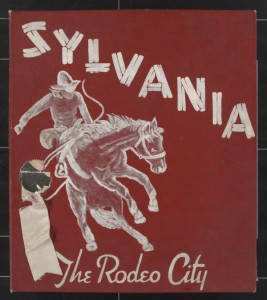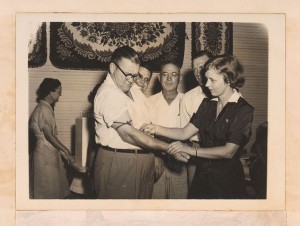
We are pleased to announce a new collection from our partners at the Screven-Jenkins Regional Library System. The collection, the Screven-Jenkins Regional Library System Collection (available at http://dlg.galileo.usg.edu/CollectionsA-Z/gcm_search.html) is one of our newest resources featuring materials from public library collections that have been digitized as part of the Bill and Melinda Gates Foundation-funded Public Libraries Partnerships Project (PLPP).
Sharon Blank, the assistant director of the Screven-Jenkins Regional Library System, discusses her selection of materials for the digitization project:
“It was brought up that there weren’t a lot of resources covering life in post-WWII life in small rural towns like we have here in Screven and Jenkins Counties in Georgia. A proposed collection focus was that small-town community life. One of our towns, Sylvania, is actually home to the longest continuously-running Livestock Festival in Georgia, possibly in the country, and in the post-war boom times, Screven County was one of the places that many people stopped at on their way to the new tourist destination of Florida. The resources I selected gave a good glimpse of what life was like in those days. Most of [the resources] were scrapbooks which had been collected to show off how great life could be in a small town… In addition to the scrapbooks and other materials offered from the library’s collection, there were also a collection of photos from one of our county’s citizens, Hilda Boykin, who literally rescued them from the trash after the Screven County News, one of the two newspapers we had during the 1950s and 1960s, closed. While most of the issues of that paper have been preserved on microfilm, most of the photos were never printed, and have the benefits of both being taken by a professional photographer and of being taken by someone with unparalleled access to events.”
Blank notes that “many of the items offered for digitization are utterly unique. If anything were to happen to the library and the items in our J. Dixon Hollingsworth, Jr. Genealogy/Georgia Room collection were damaged, those items would be completely irreplaceable…some of the items presented for digitization were so fragile that we didn’t dare have them out for the public to peruse. The digitization project will allow people around the world to get a glimpse of our area’s rich history and a better look at the life of a small rural Georgia town, without risking damage to the items in the collection.”

Blank recommends looking at the Rodeo City Scrapbook. “It was a scrapbook created for a contest, and was illustrated by Gaetanna Bazemore Lariscy, an employee of the city who was also a talented artist and member of the Sylvania Junior Woman’s Club. It is a work of art in itself, and you can see the time and care that went into creating the scrapbook for the city that she loved.”
Finally, Blank emphasizes the importance of making resources from smaller towns in Georgia available online.
“There aren’t a lot of places you can see what a small town in those times looked like through the eyes of its people, and we are glad to share a look through our people’s eyes… because communities like ours tend to be more easily overlooked and harder to research than big cities like Savannah or Atlanta, every bit of information that is shared will make it easier for the historian or genealogist to understand what was going on in the past.”
Please enjoy these new resources in the Screven-Jenkins Regional Library System Collection!


